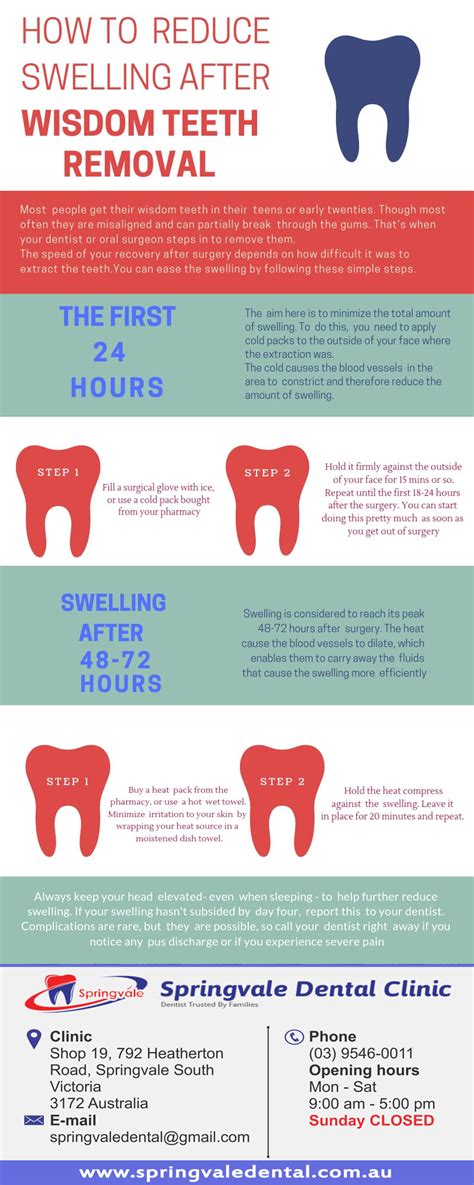How To Decrease Swelling After Wisdom Teeth Surgery
Ronan Farrow
Mar 24, 2025 · 3 min read

Table of Contents
How to Decrease Swelling After Wisdom Teeth Surgery
Wisdom teeth removal is a common procedure, but it often comes with post-operative swelling. This swelling is a normal part of the healing process, but managing it can significantly improve your comfort and recovery time. This comprehensive guide will walk you through effective strategies to minimize swelling and maximize your healing journey.
Understanding Post-Surgical Swelling
After wisdom teeth extraction, your mouth experiences trauma. The body's natural response is inflammation, leading to swelling. This swelling typically peaks around 2-3 days post-surgery and gradually subsides over the next week or two. Severity varies from person to person. While some experience minimal swelling, others may have more pronounced inflammation.
Factors Influencing Swelling:
- Complexity of the surgery: Impacted wisdom teeth requiring more extensive extraction usually result in greater swelling.
- Individual healing response: Your body's natural healing capabilities play a significant role.
- Adherence to post-operative instructions: Following your surgeon's advice meticulously is crucial for minimizing complications, including swelling.
Effective Strategies to Reduce Swelling
Here's a breakdown of effective techniques to manage post-wisdom teeth surgery swelling:
1. Ice Packs: Your Best Friend
Ice packs are your primary weapon against swelling. Apply a bag of ice wrapped in a thin towel to your cheek near the extraction site for 15-20 minutes at a time, followed by a 15-20 minute break. Repeat this cycle throughout the day, especially during the first 24-48 hours. This helps constrict blood vessels, reducing inflammation. Avoid direct ice contact with skin to prevent ice burn.
2. Elevation: Head Above Heart
Keeping your head elevated while resting also helps minimize swelling. Use extra pillows to keep your head higher than your heart. This promotes proper drainage and reduces fluid accumulation in the face.
3. Gentle Pressure: (With Caution)
Some dentists may recommend gentle pressure with a clean gauze pad on the extraction site to help control bleeding and initial swelling. Always follow your surgeon's specific instructions.
4. Saltwater Rinse: Gentle Cleansing
After the initial bleeding stops (usually a few hours post-surgery), gently rinse your mouth with warm saltwater (1/4 teaspoon of salt dissolved in 8 ounces of warm water). Do this several times a day to keep the area clean and help prevent infection. Avoid forceful rinsing; be gentle.
5. Soft Diet: Minimize Irritation
Stick to a soft food diet for the first few days, avoiding anything that requires excessive chewing or could irritate the extraction site. Think soups, yogurt, applesauce, and mashed potatoes. Gradually introduce more solid foods as you heal.
6. Over-the-Counter Medications: Pain and Swelling Relief
Over-the-counter pain relievers like ibuprofen (Advil, Motrin) or acetaminophen (Tylenol) can help manage both pain and reduce swelling. Always follow the recommended dosage instructions and consult your surgeon if you have any concerns or allergies.
7. Rest and Hydration: Essential for Healing
Getting plenty of rest is crucial for your body to heal effectively. Also, maintain adequate hydration by drinking plenty of fluids (avoid using a straw).
8. Avoid Certain Activities: Limit Strain
Avoid strenuous activities and excessive mouth movements for the first few days to prevent dislodging blood clots and increasing swelling.
9. When to Seek Medical Attention
While some swelling is normal, contact your surgeon immediately if:
- You experience excessive bleeding that doesn't stop with gentle pressure.
- You develop a high fever.
- You experience severe pain that isn't controlled by over-the-counter medications.
- You observe signs of infection, such as pus or increased redness and warmth around the extraction site.
By diligently following these recommendations, you can significantly minimize swelling after wisdom teeth surgery and enjoy a smoother, more comfortable recovery. Remember that patience and consistent care are key components of successful healing.
Featured Posts
Also read the following articles
| Article Title | Date |
|---|---|
| How To Fix A Low Spot In Concrete | Mar 24, 2025 |
| How To Delete Mgm Account | Mar 24, 2025 |
| How To Grow Ranunculus From Seed | Mar 24, 2025 |
| How To Flat Tow A Jeep Wrangler Manual Transmission | Mar 24, 2025 |
| How To Get Uconnect Navigation Free | Mar 24, 2025 |
Latest Posts
-
How Far Should My 7 Iron Go
Apr 04, 2025
-
How Far Should I Hit A 3 Wood
Apr 04, 2025
-
How Far Should A Pool Be From A Septic Tank
Apr 04, 2025
-
How Far Is Santa Maria From The Beach
Apr 04, 2025
-
How Far Is Riu Montego Bay From The Airport
Apr 04, 2025
Thank you for visiting our website which covers about How To Decrease Swelling After Wisdom Teeth Surgery . We hope the information provided has been useful to you. Feel free to contact us if you have any questions or need further assistance. See you next time and don't miss to bookmark.
